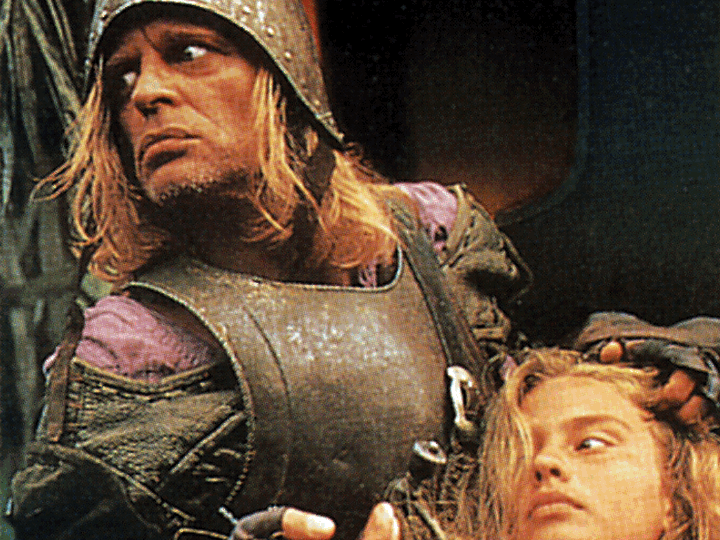Trintignant in Unlikely U.S. Debut : Stage: The French film star bows Tuesday in ‘Potestad,’ an Argentine political play at the Las Palmas Theatre.
- Share via
What is Jean-Louis Trintignant, star of “Z,” “A Man and a Woman,” “My Night at Maud’s” and “The Conformist,” doing in Hollywood this week? The 61-year-old French star, veteran of 100 films, is definitely not here shooting a movie. He is instead making his American stage debut Tuesday at the Las Palmas Theatre in six performances of “Potestad,” a powerful political play by Argentine playwright Eduardo Pavlovsky.
The Las Palmas performances, which will be done in French, follow a critically acclaimed concert reading of the play last summer at France’s Avignon Festival. They also precede his taking the play back home for a limited run at Paris’ Atelier Theatre and an ensuing French tour.
“Potestad” is being presented by Stages Theatre Center as the final event of its yearlong 10th anniversary celebration. It will be directed by Paul Verdier, who is also Stages’ artistic director and the man who invited Trintignant here to perform. The two men have been friends since the late ‘50s when Verdier worked as assistant director on a production of “Hamlet” starring the actor.
Verdier says he sent Trintignant the play seeking production advice, never thinking he would want to take it on himself. But the director clearly underestimated Trintignant’s affinity for the stage, Argentine politics and this particular role.
Although Trintignant first came to international attention in Roger Vadim’s 1956 film, “And God Created Woman,” he had already begun a stage career that has since led to his performing 40 plays in France. He was one of a small group of European actors and directors who went to Argentina in 1979 on a fact-finding mission, and, says Trintignant, he was impressed by “the political strength of the play, as well as its intelligence and lack of didacticism.”
“Potestad” dramatizes the horrific stealing of children during the Argentine military dictatorship of the late ‘70s and early ‘80s. “The Man” in the play confronts middle age, his vulnerability to a younger wife and, most important, the loss of the daughter it appears was never his to begin with.
Playwright Pavlovsky has called his 75-minute play “an emotional striptease,” and, despite a minor second character, it is essentially a one-man show. “I was immediately interested in the play and attracted to this character,” says Trintignant. “You identify with him--he is appealing, sympathetic, moving. He is a horrible man also, but you don’t realize this so much during the play as afterward, when you think about it at home.
“It is also such good drama,” adds Trintignant. “The surprise is that the first part is so funny. People were laughing like crazy. The strength of the play is that it begins as burlesque comedy in the first part, then takes its tragic turn.”
Once Trintignant was hooked, Verdier came up with what he calls “a little blackmail.” If he wanted to do the play in Paris, says Trintignant, “the condition to do it was that I had to play it here first.”
This is obviously a play close to Verdier’s heart as well. Verdier may have been raised in Paris, but he was born in Argentina, and playwright Pavlovsky and his acting company were artists-in-residence at Stages during its Pavlovskyfest in 1987. Pavlovsky himself played “The Man” in “Potestad” at Stages then, also taking the show on to New York, London, Spain and South America. (Pavlovsky will be at Stages for Saturday’s performance, which will be followed by a panel discussion in English, French and Spanish.)
Verdier and Trintignant hope the next step is an English-language production of the play, and Verdier says he originally offered the play to two prominent American actors with thoughts of a double bill during this run. While both expressed interest, he says, timing didn’t work out. But, says Trintignant, “I hope all American actors of that age (the narrator refers to himself as 57) will fight over playing it in English.”
There are about 50,000 French-speaking people in Southern California, says Verdier, who hopes to draw on those people as well as theatergoers who turned out en masse for foreign-language fare during the 1984 Olympic Arts Festival. Early response indicated that they couldn’t fit everyone in at the 49-seat Stages Theatre Center, he says, so they opted for the 396-seat Las Palmas.
The Las Palmas also offers a venue similar in size and feel to the Atelier Theatre in Paris, which is expected to house the play next year. After that, says Trintignant, he’s hoping for a major tour through France. “It is a play that doesn’t need any sets,” he says. “You could play it on a cafe terrace, a church, any place.”
Trintignant has done this before, and two years ago concluded a major tour of France with William Gibson’s “Two for the Seesaw.” That show played 100 performances in Paris, then toured on and off in Lyons, Marseilles and elsewhere for two more years.
“Potestad” follows a film comeback of sorts for the French actor. Trintignant, who won the best actor award at the Cannes Film Festival in 1969 for Costa-Gavras’ “Z,” went on to make other films for Lelouch, Truffaut and his ex-wife, Nadine Trintignant, but he concedes they did not achieve the international success of “Z,” Bertolucci’s “The Conformist” or Lelouch’s “A Man and a Woman.”
“That was a long time ago,” he says softly, his hair gray now. “I looked young for a long time in those years, and then I aged all at once.”
He also hastened his own retirement, telling a news conference at the Venice Film Festival in 1987 that he was retiring from films to head for the countryside and a new life among non-film people. “I don’t want any commitments,” he said at the time.
Interviewed in Verdier’s home, where he is staying during this visit, the actor says he stopped making films for three years, instead living “close to nature” in the French countryside where he worked the land, cut wood, read books. He did some theater then, he says, but didn’t really get back into films until a little more than a year ago.
Since then, says Trintignant, he appeared in two films for TV and two feature films. One thing in his favor, he says, was that he’d made so many movies before that that hardly anyone knew he’d pulled back. “Because of television, which keeps showing my films, audiences didn’t know I stopped making films. Professionals knew, but not audiences.”
Coming up, he says, is a new film for Polish filmmaker Krzysztof Kieslowski. He has also directed two movies and is planning to direct a new adaptation of Albert Camus’ “The Stranger,” which he would shoot in Cairo.
Asked if he will talk with Hollywood filmmakers while he is here, the actor says, “No,” pauses, says “No” again. For one thing, he explains, his English is poor. And, for another, “I am too old now to do two things at once. I like to concentrate on one thing at a time. I am concentrating on the play right now, and I hope to play ‘Potestad’ for a long time.”
More to Read
The biggest entertainment stories
Get our big stories about Hollywood, film, television, music, arts, culture and more right in your inbox as soon as they publish.
You may occasionally receive promotional content from the Los Angeles Times.










